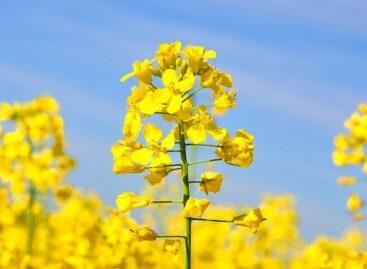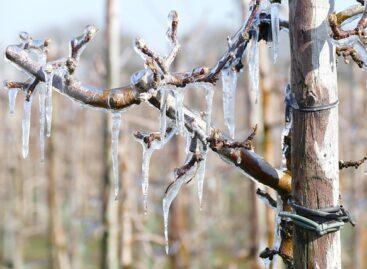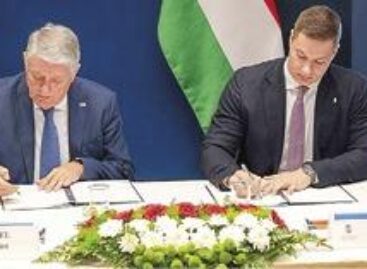We must prepare for changes affecting the future of the agricultural sector
Agricultural players must continuously adapt to rapidly changing external circumstances and prepare in time for the new European Union agricultural support cycle starting after 2027, which is expected to contain significant modifications.

(Photo: Pixabay)
The above key sentence was spoken at a roundtable discussion organized by the National Chamber of Agriculture and BASF Hungária Kft. The NAK and BASF Hungária Kft., which deals with input material distribution, organized a roundtable discussion in which they sought answers to the challenges facing the sector with the involvement of farmers, interprofessional organizations and European Union experts. Viktor Balázs, the National Vice President of NAK responsible for environmental sustainability and innovation, emphasized in his welcoming speech that one of the main goals of the roundtable discussion is to provide the Chamber of Agriculture with a comprehensive picture of the practical challenges that farmers face during production – with particular regard to the effects of climate change and the adaptation difficulties resulting from the transformation of the agricultural support system. According to Gábor Hajnal, Head of the Agricultural Division of BASF Hungária Kft., sustainable farming practices will be particularly valued in the new EU support cycle starting after 2027, therefore it is of utmost importance that producers start the practical application of the elements of the Agri-ecological Program (AÖP) and the Agri-environmental Management Program (AKG) now, so that they can respond to the expectations with solutions tailored to their own farms in preparation for the next cycle. We are facing serious challenges, the time has come to prepare for the support period ahead. Agriculture is our heart, and it is our responsibility to think ahead and support farmers in successful adaptation, he said. Dr. Dávid Mezei, advisor to the European Parliament, pointed out that the vast majority of the European Union budget comes from member state contributions, the amount of which the member states – especially the net contributors – are trying to keep as low as possible. He stressed that due to the lack of economic growth in the large net contributor member states – primarily the Nordic countries – no expansion is expected on the revenue side of the common EU budget. At the same time, new elements have appeared on the expenditure side, which will place a significant burden on the next seven-year budget cycle: the repayment of EU bonds issued during the COVID-19 pandemic, as well as increasing defense spending, are also included in the next 7-year common budget.
The new CAP is still in its early stages, with the European Commission having only put forward a proposal containing guidelines so far
The draft budget for the new budgetary cycle, including specific budget figures, is expected to be published in July 2025. The Commission’s plans include the abolition of the current two-pillar support system and the integration of the agricultural budget into a single, comprehensive EU budget fund. The advisor expressed his concerns in this regard, stressing that this would be a serious mistake, which in his opinion would only serve to mask the expected reduction in available resources. The roundtable participants agreed that a simpler support system cannot be expected in the next EU cycle, but that the role of Member States in the allocation of resources is expected to be strengthened. Tamás Petőházi, President of the National Association of Grain Growers and President of the National Department of the Horticultural and Supply Industry of the National Agricultural Council, believes that it is inevitable that the smaller amount available within the framework of the new Common Agricultural Policy can be used well, or even more efficiently, than before. Viktor Balázs emphasized that the aim of the chamber is to provide farmers with a predictable and well-planned support environment, which is based on predictable foundations similar to the current structure, if possible. He also emphasized that the National Chamber of Agriculture considers it an important task to alleviate the administrative burden on farmers. To this end, a service concept is being developed that would significantly reduce the administrative tasks related to support for smaller farms. In addition to the expected transformation of the support system, the roundtable discussion also discussed market difficulties related to products from third countries and producers’ responses to the challenges caused by climate change. The participating farmers reported that in recent years they have begun to transform the cropping structure, and alternative crops have been introduced in several regions on an experimental basis. Based on the experiences so far, the cultivation of autumn poppy, sorghum or green peas may represent a promising solution in more and more regions, partially replacing traditional arable crops. Following the droughty summers, interest among farmers has increased, especially in autumn-sown crops.
The transformation of the crop structure is significantly influenced not only by increasingly unpredictable weather conditions, but also by market demand
Indeed, the existence of a stable purchasing market is essential for the successful cultivation of a crop. Based on what was said at the roundtable discussion, the National Chamber of Agriculture, the Ministry of Agriculture and the National Association of Grain Growers, and other partner organizations are working together to integrate additional producer protection mechanisms into the legal environment. In addition to the 30-day payment deadline that has already come into effect, such a measure could, for example, prevent buyers from making subsequent complaints after receipt. During the discussion, the activities of the NAK small-crop working group were also discussed, as a result of which the competent authorities have extended the authorization documents for plant protection products to more than 400 crops in recent years. The aim is to ensure that the necessary technological conditions are available for competitive and safe production even for smaller crops.
NAK
Related news
Related news
A colourful selection of sauces on the Easter table
🎧 Hallgasd a cikket: Lejátszás Szünet Folytatás Leállítás Nyelv: Auto…
Read more >Forced paths: trends and decisions in 2026
🎧 Hallgasd a cikket: Lejátszás Szünet Folytatás Leállítás Nyelv: Auto…
Read more >







